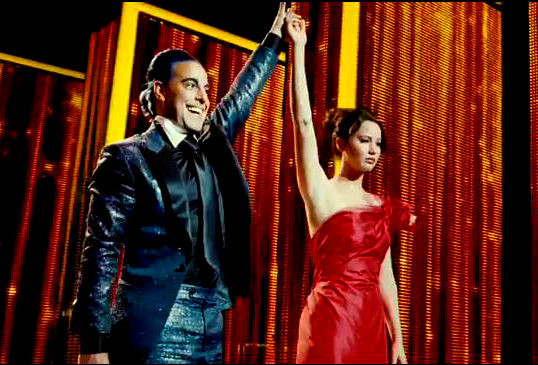 |
| Jennifer Lawrence as Katniss Everdeen in The Hunger Games |
Guest post written by Molly McCaffrey. Originally published at I Will Not Diet. Cross-posted with permission.
***SPOILER ALERT: Though there are no real spoilers here, one scene and the basic premise of the film are discussed in detail. If you’ve seen the preview for The Hunger Games, reading this review won’t reveal anything new, but if you haven’t seen the preview, I’d suggest you skip the part I’ve marked below.***
Possibly the most important moment in the film adaptation of The Hunger Games occurs when protagonist Katniss Everdeen (played with a perfect cross of vulnerability and strength by Kentucky native Jennifer Lawrence) confesses to her stylist Cinna (the circumspect Lenny Kravitz who aptly conveys the enormity of Katniss’ situation with his searing eyes) that she’s not very good at making people like her.
Katniss has just arrived in the capital to participate in the 74th Annual Hunger Games and is about to be interviewed on television by Caeser Flickerman (a blue-haired, ponytailed Stanley Tucci doing a slightly more likeable version of reality show host Ryan Seacrest). Her interview will be seen by absolutely everyone in Panem, the futuristic version of North America where this story takes place, so the stakes are high.
For this reason, Katniss is more than a little anxious.
SPOILER ALERT: SKIP THIS PARAGRAPH IF YOU HAVEN’T SEEN THE HUNGER GAMES PREVIEW . . . Adding to her anxiety is the fact that, just days before the interview takes place, Katniss volunteered to take her sister’s place when she was chosen by lot—calling to mind Shirley Jackson’s classic short story “
The Lottery” — to represent their district in the Hunger Games that year.
The “Hunger Games” is a twisted, fight-to-the-death, televised competition — think William Golding’s
Lord of the Flies and Richard Connell’s “
The Most Dangerous Game” crossed with a reality show like
Survivor — designed by Panem’s capital city to punish and intimidate the outlying districts of Panem for the uprising they orchestrated unsuccessfully against the capital 74 years before.
That risky political move ultimately led to the obliteration of one of the thirteen districts and the virtual enslavement of the other twelve districts (creating a world not totally unlike George Orwell’s
1984 or Margaret Atwood’s
The Handmaid’s Tale). As a result, the people who live in the districts are now forced to live in such extreme poverty that dying of hunger is one of their greatest fears.
Katniss isn’t just nervous because she’s about to appear on national television or enter an arena in which only one person will come out alive; she’s also apprehensive because she knows that one of the ways a “tribute” — meaning a player in the Games — can get ahead is by making the people of the capital fall in love with her since they are allowed to sponsor tributes in the Games and send them gifts—medicine, water, weapons, anything — to help them win. So if she doesn’t make them like her, she could be sacrificing her own life in the process.
 |
| Stanley Tucci as Caesar Flickerman and Jennifer Lawrence as Katniss Everdeen in The Hunger Games |
But Katniss feels that she isn’t the kind of person people like—she’s not warm or engaging, positive or open, nor is she particularly feminine (at least until her prep team in the capital puts her through a Twilight Zone-esque makeover process), yet these are the qualities that television audiences usually respond to. So when she is faced with the task of entertaining an entire country of viewers, she is terrified not just that they won’t like her, but that they’ll go so far as to root against her.
This is a common fear for women in our society, especially young women who are expected to be have cheerful personalities and sunny dispositions, who are supposed to be both people pleasers and objects of the male gaze. They are not supposed to be contemplative or cynical, as Katniss certainly is after having grown up in a society that forces her to kill squirrels on a daily basis to feed her fatherless family. So her fears about not being able to woo her television audience are not only valid, but also relatable.
If Katniss’ apprehensions about not being able to put on the right face for society are driven by her very real fear of dying in the arena, the fears of young women today are usually motivated by less sober concerns, but ones that surely feel just as profound when you’re sixteen years old.
Like Katniss, young women today worry about not being pretty enough or likeable enough, but they also worry about how their ability to do those things will ultimately affect their ability to find both happiness and success in life, a fate that may seem as serious as losing your life when you’re a teenager. So it’s no wonder this story appeals to young people — girls and boys alike. It speaks to their most overwhelming concerns: Will I be good enough? Will I be strong enough? Will people like me?
Ultimately Katniss is able to perform for the audience during her televised interview and win them over: not by being sunny or charismatic or entertaining—though she is forced to do the latter when she twirls in her designer ball gown, alighting the flames inside its skirt (an allusion to Katniss’ inner strength) — but by being herself, by being a real person with genuine thoughts and emotions, making her more honest and vulnerable than anyone else in the giant theatre full of costumed adults who congratulate and cheer for the tributes in a way that reveals their inability to understand the gravity of what they are doing to them.
It’s a message repeated throughout the rest of her story and, more importantly, one we need to send more often to young people: Be yourself — not who other people expect you to be — and we will like you for who you are.
I cannot explain how much I appreciate Suzanne Collins for putting such an important message out in the world and for giving us the great gift of Katniss Everdeen, one of the most admirable and honest young heroes ever committed to the page or screen. And I hope you will appreciate her as much as I do.
Molly McCaffrey is the author of the short story collection How to Survive Graduate School & Other Disasters
, the co-editor of Commutability: Stories about the Journey from Here to There
, and the founder of I Will Not Diet, a blog devoted to healthy living and body acceptance. She teaches English and creative writing classes and advises writing majors at Western Kentucky University in Bowling Green, Kentucky.



thank you for this post!
This is one of the many reasons I love these books and movies!